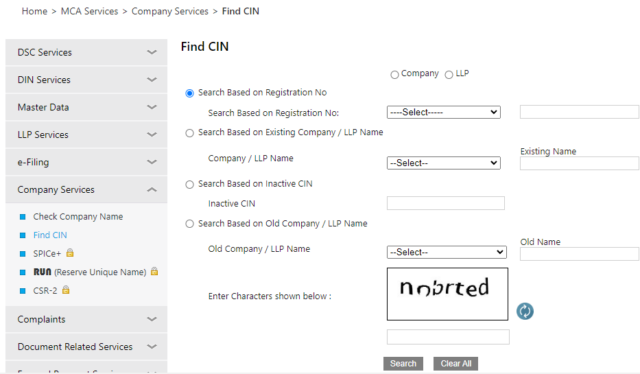Top 10 Best Private Banks in India List 2025
January 09, 2025
January 09, 2023


CIN or Corporate Identification Number is a unique identification numeric sequence assigned to registered companies in India by a registrar of companies popularly known as ROCs. The Corporate Identification Number is an important recognition symbol that holds the ground for a company’s identity and comes in handy while the company is under audit. When providing company reports, the identification number must be mentioned in the documents submitted to the Ministry of Corporate Affairs (MCA). Moreover, the last six digits of a CIN denote the Company Registration Number (CRN).
As discussed, the expansion of the abbreviation, i.e. CIN, is Corporate Identification Number. Understanding the CIN a bit more deeply, we come to the reverse engineering of the digits and what they represent. The identification number incorporates majorly six sections. Here are the following observations.
An example of a CIN number is – U 12345 DL 2020 PLC 098765.
One of the primary purposes of a CIN number is assigned to companies for tracking and monitoring the activities in terms of financial transactions, income statements, cash flow, etc. Moreover, these are regularly tracked from the company’s incorporation by a Registrar of Companies. Furthermore, if any authorities need information pertaining to any company, they can easily do so with the help of a Corporate Identity Number. These details will be as listed under the Ministry of Corporate Affairs.
A company can easily get its CIN number by following the below steps.


There are specific terms and abbreviations used in a Corporate Identity Number context. It can be helpful for anyone to be aware of these terms when required to use the CIN number. The details are as listed below.
| Abbreviations | Full Forms |
| FLC | Financial Lease Company as Public Limited |
| FTC | A subsidiary of a Foreign Company as a Private Limited Company |
| GAP | General Association Public |
| GAT | General Association Private |
| GOI | Companies owned by the Government of India |
| NPL | Not-for-Profit License Company |
| OPC | One Person Company |
| PLC | Public Limited Company |
| PTC | Private Limited Company |
| SGC | Companies owned by State Government |
| ULL | Public Limited Company with Unlimited Liability |
| ULT | Private Company with Unlimited Liability |
A Corporate Identity Number is used on documents such as invoicing, business transaction receipts, bills, etc. Moreover, one can find the CIN Number on memos, letterheads, notices, or any company’s publications to establish an identity so that anyone on the receiving end can track the company’s profile. However, the primary usage of a CIN number still rests with appearing on the audit reports, annual reports, and e-submissions on the Ministry of Corporate Affairs e-portal.
Getting a Corporate Identity Number is an essential step in the incorporation process, overseen by the Registrar of Companies. A corporate entity necessarily gets its CIN number assigned to them, without which it may incur hefty penalties. Generally, companies have to pay an amount of INR 1000 per day till they can get their CIN number sorted. Moreover, the upper limit has been restricted to INR 1,00,000.
Given that CIN numbers are allotted as per their status concerning classifications, they can be changed in case of any transition of the company’s profile. Moreover, when the company changes their location of operation, the section of CIN, which denotes the registration state, also should be changed. Lastly, if any company is planning to change their industry or specialization, it must get its CIN number changed. These scenarios, as mentioned above, call for a change in the Corporate Identification Number of a company. All the requests for changes can be addressed with the Ministry of Corporate Affairs e-portal.
When registered, companies are assigned a corporate identity number which is not the same as a GSTN. Under the GST regulations, companies are separately assigned a Goods and Service Tax number when registering for the GST structure. The latter is majorly for businesses in replacement of the Tax Identification Number assigned to them by state tax authorities under the VAT structure. As the term suggests, the primary purpose is to track a company’s taxes.
| Also, read |
| Pradhan Mantri MUDRA Yojana |
| Startup Business Loans |
| 10 Business Loan Schemes for Women Entrepreneurs |
| Machinery Loan |
| Business Loan under CGTMSE Scheme |









Top 10 Best Private Banks in India List 2025
January 09, 2025

Top10 List of Petrol Pump Companies in India
January 09, 2025

Dairy Farm Loan in 2025 : Online Procedure
January 09, 2025

Top 10 Best Bank for Home Loan In India…
January 09, 2025

Top10 Best Student Credit Cards in India 2025
January 09, 2025
© 2025 www.urbanmoney.com. All rights reserved.

Need Loan Assistance?